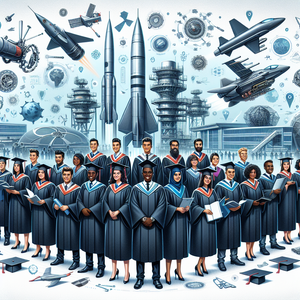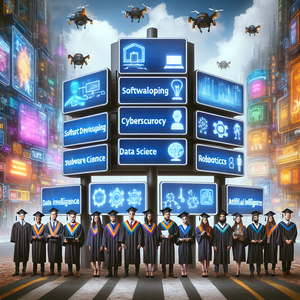
15 Exciting Career Paths for Aerospace Engineering Graduates: Chart Your Course in Aviation and Space
Aerospace engineering is a dynamic and rapidly evolving discipline focused on the design, development, and maintenance of aircraft, spacecraft, and their supporting systems. Graduates in this field find themselves at the forefront of innovation, with a plethora of career options spanning commercial aviation, defense, and space exploration. Given the industry's robust growth—spurred by technological advancements and a rising demand for cutting-edge solutions—there is no shortage of opportunities. This article explores 15 promising career paths for aerospace engineering graduates, shedding light on the skills needed, typical responsibilities, and the significant contributions each role makes to the aerospace sector.
Job Summaries:
Aerospace Engineer:
- As the architects of flight, aerospace engineers design, develop, and test everything from aircraft to spacecraft.
- They engage in research to enhance designs and analyze performance data.
- Typically, a bachelor's degree in aerospace engineering or a related field is required, along with strong analytical abilities and proficiency in computer-aided design (CAD) software.
- Their work is crucial for ensuring the safety and efficiency of aerospace technologies, making them essential players in the industry.
Aerospace Technician:
- These hands-on professionals support engineers in assembling and maintaining aerospace systems.
- They perform inspections and troubleshoot issues, ensuring compliance with safety standards.
- A degree in aerospace technology can be beneficial, along with strong technical skills.
- Aerospace technicians are vital in applying engineering principles in real-world contexts, directly impacting the reliability of aerospace operations.
Aerospace Project Engineer:
- Project engineers oversee aerospace projects from start to finish.
- They ensure that projects adhere to design specifications and budget constraints.
- They coordinate between engineers and stakeholders.
- They manage resources and timelines effectively.
- A degree in aerospace or mechanical engineering is essential.
- Strong leadership and communication skills are necessary.
- Their role is critical in ensuring that aerospace projects are delivered on time and within budget.
Propulsion Engineer:
- Focused on designing propulsion systems for aircraft and spacecraft.
- Conduct simulations and experiments to enhance performance.
- A bachelor's degree in aerospace or mechanical engineering is necessary.
- Expertise in fluid dynamics and thermodynamics is required.
- Contributions are vital for improving fuel efficiency.
- Aim to minimize environmental impact.
Systems Engineer:
- Systems engineers ensure that various subsystems within aerospace projects integrate seamlessly.
- They are involved in every stage of development, from gathering requirements to testing.
- A degree in systems engineering or a related field is typically required, along with solid analytical and problem-solving skills.
- Their role is essential in delivering complex aerospace projects that function harmoniously.
Aerospace Quality Assurance Engineer:
- These engineers ensure that aerospace products meet stringent safety and performance standards.
- They develop testing protocols and conduct audits, collaborating with engineering teams to identify areas for improvement.
- A background in aerospace engineering or quality assurance, along with certifications like Six Sigma, is often required.
- They play a critical role in ensuring that safety remains a top priority in aerospace products.
CAD Technician:
- CAD technicians translate engineering concepts into detailed technical drawings and models.
- They work closely with engineers to create precise diagrams that guide manufacturing processes.
- Proficiency in CAD software and a background in drafting or design technology are typically required.
- Their work is crucial for providing the design documentation needed for production.
Aerospace Research Scientist:
- These scientists push the boundaries of knowledge in aerodynamics, materials science, and propulsion technologies.
- They conduct experiments and analyze data to foster innovative solutions.
- A Ph.D. in aerospace engineering or a related discipline is generally necessary.
- Their research plays a pivotal role in advancing technology within the aerospace sector.
Aerodynamics Engineer:
- Specializing in the interaction between air and moving objects
- Use computational fluid dynamics and wind tunnel tests to optimize aircraft and spacecraft designs
- A background in aerospace or mechanical engineering is essential
- Strong analytical skills are important
- Key contributors to enhancing the efficiency and safety of aerial vehicles
Aerospace Maintenance Engineer:
- Maintenance engineers ensure that aircraft and aerospace systems remain operational and safe.
- They perform inspections and oversee repairs.
- Requiring a degree in aerospace engineering or a related field, along with relevant certifications.
- Their role is critical for maintaining the reliability of aerospace operations.
Flight Test Engineer:
- These engineers plan and conduct flight tests to evaluate aircraft and spacecraft performance.
- They analyze data gathered during tests and suggest design improvements.
- A degree in aerospace engineering is required, along with strong analytical and communication skills.
- Their work is vital in validating the performance and safety of aerospace vehicles.
Technical Sales Engineer in Aerospace:
- Acting as a bridge between engineering and sales, technical sales engineers use their expertise to help clients understand product offerings.
- A solid understanding of aerospace products and excellent communication skills are essential.
- A degree in aerospace engineering or a related field is typically preferred.
- This role is key in driving sales through technical knowledge and strong client relationships.
Aerospace Data Analyst:
- Data analysts in aerospace collect and interpret data to inform decision-making and improve processes within the industry.
- A degree in data science, aerospace engineering, or a related field is generally required, along with strong analytical skills.
- Their work is essential for leveraging data to enhance performance and efficiency in aerospace operations.
Spacecraft Systems Engineer:
- These engineers design and integrate systems within spacecraft, ensuring all components work together effectively.
- They are involved in missions from conceptual design to launch.
- A degree in aerospace engineering or a related field is essential, along with strong problem-solving skills.
- Their contributions are vital for the success of space missions.
Aerospace Software Engineer:
- Software engineers in aerospace develop and maintain software for simulations, flight control systems, and data analysis.
- Strong software development skills and experience with relevant programming languages are necessary.
- A degree in computer science, software engineering, or aerospace engineering is usually required.
- Their role is increasingly important as software becomes integral to modern aerospace systems.
For aerospace engineering graduates, the career landscape is diverse and filled with opportunities that contribute significantly to aviation and space exploration. Each role offers unique challenges and rewards, with many experiencing growth due to ongoing technological innovations. By exploring these career paths, aspiring professionals can find niches that align with their skills and interests, paving the way for successful and fulfilling careers in this dynamic industry. For those looking to dive deeper into job openings and industry trends, online job boards and professional networks are invaluable resources for the next steps in their careers.
Explore More Jobs

